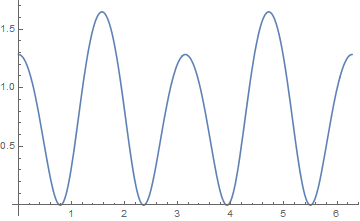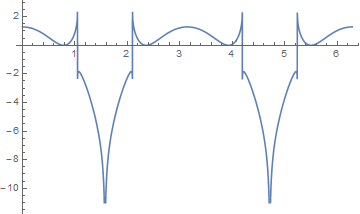I already asked this on stack overflow but was redirected here.
I am trying to solve the (highly non-linear) following system of equations :
with
and $g_0$, $\Lambda$ are positive constants which i can attribute a numerical value to. $\sinh^{-1}$ is the inverse hyperbolic sine function.
Mathematica gives me no result when I try to use the function Solve. So I thought it would be a good idea to first try to numerically evaluate the integrals $I_n$ in terms of the parameters $\Delta_1$, $\Delta_2$ and $\Delta_3$ before putting it back into the equations.
My question : is there any function designed to give a numerical approximation of an integral which depends on some real parameters ? It could be for instance a polynomial on these parameters, or something more complicated...
Thanks in advance for your time.
EDIT : Here is the (corrected according to comments) code I've tried to use :
f0[d0_?NumericQ, d1_?NumericQ, d2_?NumericQ] := NIntegrate[
ArcSinh[(10*d0)/(d0 + d1*Cos[2*t]^2 + d2*Cos[2*t])], {t, 0, 2*Pi}]
f1[d0_?NumericQ, d1_?NumericQ, d2_?NumericQ] :=
NIntegrate[
Cos[2*t]*ArcSinh[(10*d0)/(d0 + d1*Cos[2*t]^2 + d2*Cos[2*t])], {t, 0,
2*Pi}]
f2[d0_?NumericQ, d1_?NumericQ, d2_?NumericQ] :=
NIntegrate[
Cos[2*t]^2*ArcSinh[(10*d0)/(d0 + d1*Cos[2*t]^2 + d2*Cos[2*t])], {t,
0, 2*Pi}]
f3[d0_?NumericQ, d1_?NumericQ, d2_?NumericQ] :=
NIntegrate[
Cos[2*t]^3 ArcSinh[(10*d0)/(d0 + d1*Cos[2*t]^2 + d2*Cos[2*t])], {t,
0, 2*Pi}]
f4[d0_?NumericQ, d1_?NumericQ, d2_?NumericQ] :=
NIntegrate[
Cos[2*t]^4*ArcSinh[(10*d0)/(d0 + d1*Cos[2*t]^2 + d2*Cos[2*t])], {t,
0, 2*Pi}]
FindRoot[{d0 ==
d0*f2[d0, d1, d2] + d1*f4[d0, d1, d2] + d2*f3[d0, d1, d2],
d1 == d0*f0[d0, d1, d2] + d1*f2[d0, d1, d2] + d2*f1[d0, d1, d2],
d2 == 2*(d0*f1[d0, d1, d2] + d1*f3[d0, d1, d2] +
d2*f2[d0, d1, d2])}, {{d0, 1.}, {d1, 1.}, {d2, 1.}}]
I've tried many different guesses for the initial values but it looks like it is always converging to zero. Any suggestion of a more efficient way to approach the problem would be very appreciated. Thanks !








FindRoot[]andNIntegrate[]for this task; see if you can come up with good initial estimates for your roots. $\endgroup${}button above the edit window. $\endgroup$NIntegrate. When correctedFindRootyields an answer but I doubt that is is very good. All the numbers are very close to zero. $\endgroup$